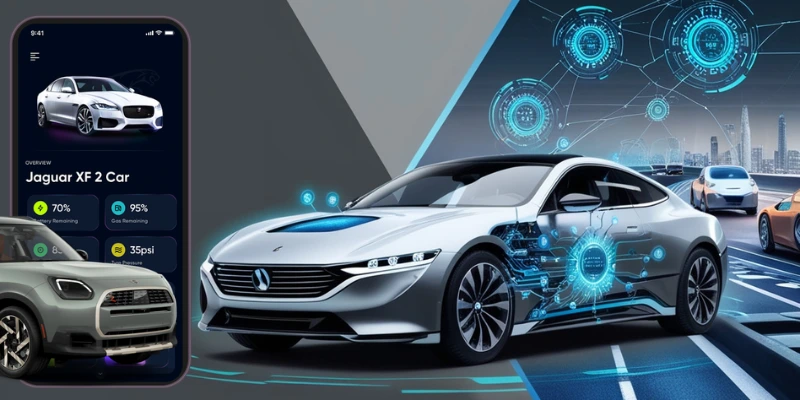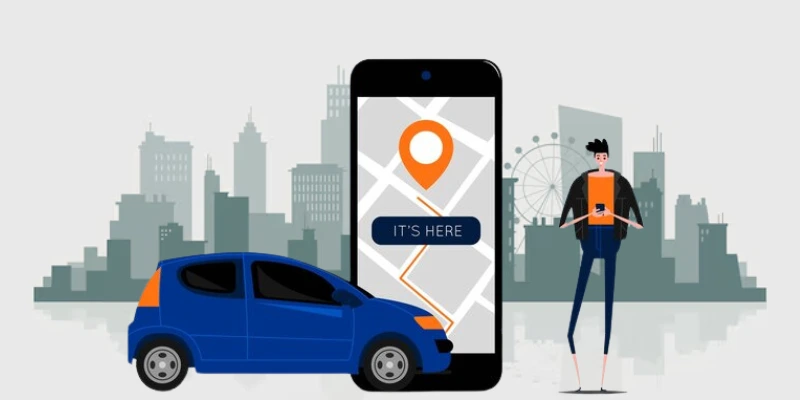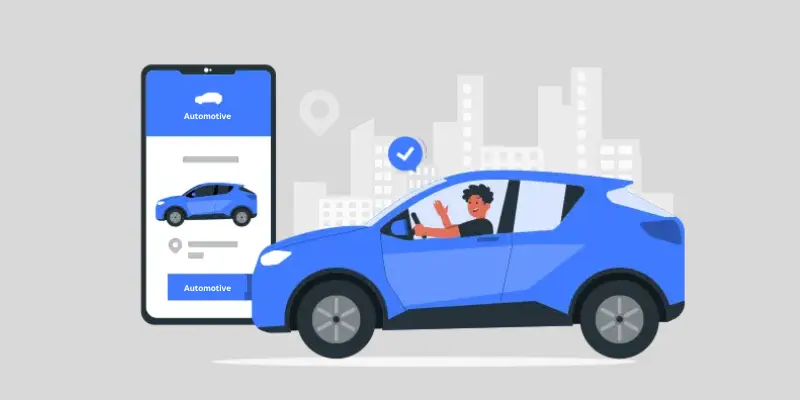The automobile sector is facing a new change driven by cutting-edge automotive software development solutions and changing customer demands. Traditional manufacturing methods are being replaced by smart, new technologies, leading to cars that are safer, more efficient, and environmentally friendly.
Electric cars are at the heart of this shift. They aim to greatly reduce carbon pollution while adding technologies that improve user ease and operating performance.
With the global car market expected to reach nearly $9 trillion by 2030, the demand for smart, sustainable, and safe transportation options is on the rise. Automotive software development is at the heart of this change, powering the future of movement.
With uses ranging from expected repair to personalized customer experiences, AI is fundamentally changing how cars are planned, made, and run. This varied effect underscores AI's critical part in setting the future of the car scene.
The Evolution of AI
The automotive industry has a rich background that extends back to the late 19th century, featured by the introduction of the first gasoline-powered automobiles. In recent years, improvements like assembly line production have changed manufacturing, making vehicles more affordable and accessible. By the late 20th century, the development of electronic systems started to enhance automotive performance, leading to features like anti-lock brake systems and electronic fuel injection.
Early applications of artificial intelligence in vehicles came in the 1980s and 1990s with the advent of modest driving assistance systems. These featured adaptive cruise control and early versions of collision avoidance systems, which relied on basic formulae to increase safety.
However, it wasn't until the 21st century that the utilization of AI in automotive technology began to severely alter automobile technology, opening the way for more complicated systems capable of real-time data processing and decision-making.
Current Market Trends
In recent years, AI technologies have experienced rapid growth within the automobile sector. The rise of machine learning, computer vision, and advanced sensor technologies has allowed makers to build smarter cars packed with features like lane-keeping assistance, automatic emergency braking, and even fully driverless driving capabilities. This change is largely driven by customers' desire for improved safety and comfort in transportation. Companies with efficient AI development services are leading the way.
Key Players in Automotive AI
Key players in the car AI space include both standard automakers and tech companies. Tesla has been a pioneer with its Autopilot system, which uses AI to allow semi-autonomous driving.
Meanwhile, companies like Waymo (a division of Alphabet Inc.) are leading the charge in building fully driverless cars that rely heavily on AI for tracking and decision-making.
Traditional automakers such as Ford, General Motors, and Toyota are also investing heavily in AI technologies to enhance their cars' powers and improve manufacturing processes.
Moreover, agreements between car makers and internet companies are becoming increasingly popular.
For instance, Cruise, a division of General Motors, uses AI to evaluate vast datasets for their self-driving cars, optimizing routes and improving safety through real-time data processing.
Similarly, companies like Motional, a joint venture between Aptiv and Hyundai, are focused on developing advanced autonomous driving technologies that leverage AI for better performance in complex driving situations. As a result, the need for advanced automotive software development solutions is also increasing.
The Broader Impact of AI
The merger of AI in automotive business is not limited to self-driving technology; it also includes unique experiences for drivers and riders. Voice-activated personal helpers driven by AI are changing how users interact with their cars, allowing for hands-free control over driving and entertainment systems.
Overall, the growth of AI in the car business indicates a bigger trend towards better, safer, and more efficient vehicles. As technology continues to progress, the merger of AI will likely play a critical role in shaping the future face of transportation.
The businesses that are spending highly in automotive software development services are keeping pace with the new trends.
Enhancing Safety Through AI
Advanced Driver Assistance Systems
Overview of ADAS
Advanced Driver Assistance Systems are a group of technologies meant to improve car safety by helping drivers in different parts of driving. These systems harness a mix of sensors, cameras, radar, and powerful algorithms to provide real-time information and help to the driver. This is one of the most prominent features used by AI development services providers. Key components of ADAS include:
-
-
Adaptive Cruise Control: This function automatically changes the vehicle's speed to keep a safe following distance from the vehicle ahead, greatly lowering the risk of rear-end accidents.
-
Lane Departure Warning and Lane-Keeping Assist: LDW warns drivers when they accidentally drift out of their lane, while LKA actively guides the car back into its lane if necessary.
-
Automatic Emergency Braking: AEB systems sense possible accidents and automatically engage the brakes if the driver does not react in time, aiming to reduce or avoid an accident.
-
Blind Spot Detection: This system tracks blind spots and tells drivers of cars in nearby lanes, helping to avoid dangerous lane changes.
-
Cross Traffic Alert: CTA tells drivers of coming traffic from the side when backing out of parking spots, improving safety during movements.
-
You can choose the best automotive software development in USA, like JPLoft, as they have extensive expertise in developing efficient automotive software solutions.
Impact on Accident Reduction
The adoption of ADAS has shown a major effect on lowering mishaps. Studies show that cars equipped with these devices have lower crash rates compared to those without.
For example, Forward Collision Warning and Automatic Emergency Braking could possibly avoid 29% of all passenger car crashes in the U.S. Additionally, Lane Departure Warning and Lane-Keeping Assist could lower crashes by up to 19%.
These figures show the critical role ADAS plays in improving road safety by solving common causes of crashes, such as confusion, tiredness, and poor sight.
Autonomous Vehicles Levels of Automation
Autonomous cars are divided into levels based on their degree of automation, running from Level 0 to Level 5. The levels are described as follows:
-
-
Level 0: No technology; the person driver is responsible for all jobs.
-
Level 1: Driver aid; tools like ACC or LKA support but do not take full control.
-
Level 2: Partial automation; the car can handle both turning and acceleration/deceleration but needs constant direction from the driver.
-
Level 3: Conditional automation; the car can handle most driving chores but needs human involvement in difficult situations.
-
Level 4: High automation; the car can work freely in particular situations without human assistance.
-
Level 5: Full automation; no human action is needed under any situation.
-
Role of AI in Autonomous Vehicles
AI plays a crucial part in allowing driverless cars to sense their surroundings, make choices, and control their moves. Key tasks include:
-
-
Perception: AI systems handle input from various devices (LiDAR, video, radar) to build a complete understanding of the vehicle's surroundings. This feature helps cars to identify barriers, people, and other vehicles in real-time.
-
Decision-Making: Advanced computers evaluate the visible data to make informed choices about direction and moves. This includes determining when to change directions, stop at traffic lights, or avoid obstacles.
-
Control: AI systems perform driving orders based on decision-making processes. This includes changing turning directions, acceleration, and stopping in response to dynamic road conditions.
-
Keep in mind that integrating these delicate features requires expertise, and companies like JPLoft have the experience of developing AI softwares. We can help in efficient and effective automotive software development.
Case Studies of Companies Developing Autonomous Vehicles
Several companies are at the forefront of building driverless cars, leveraging AI technologies for better transportation solutions:
-
-
Waymo: A division of Alphabet Inc., Waymo is a leader in driverless car technology. Their self-driving cars utilize a mix of LiDAR, cameras, and AI systems for tracking and object recognition. Waymo's cars have finished millions of miles on public roads while showing advanced skills in difficult urban settings.
-
Cruise: Owned by General Motors, Cruise is developing fully driverless cars for urban travel. Their technology combines AI for real-time decision-making and guidance. Cruise has performed extensive testing in places like San Francisco, showing its ability to handle complex traffic situations safely.
-
Tesla: Tesla's Autopilot system marks a major step toward automation. While currently classed as Level 2 automation, Tesla constantly changes its software through over-the-air updates to increase its capabilities. The company aims for full automation with future versions that will rely heavily on AI for sensing and control.
-
These companies are efficiently utilizing automotive software development solutions to compete in the market.
AI in Manufacturing and Supply Chain
Smart Manufacturing
Use of AI in Production Processes
Artificial Intelligence is changing manufacturing through the adoption of smart manufacturing methods. Key uses include robots and predictive maintenance, which greatly improve production processes.
AI-powered robots are increasingly deployed on production lines to perform repeated tasks with high accuracy and speed, reducing human mistakes and maximizing output. These robots can work nonstop, leading to improved production without tiredness.
Predictive repair is another important application of AI in industry. By studying data from machinery devices, AI can spot trends that suggest possible equipment breakdowns before they appear. This proactive method allows makers to arrange repair during non-peak hours, lowering unexpected downtime and extending the lives of machines.
For instance, companies like Ford utilize digital twin technology to create virtual copies of their equipment, allowing real-time tracking and predictive analytics that improve repair plans. Using the best automotive software development solutions can help in developing efficient software.
Impact on Efficiency and Cost Reduction
The integration of AI in industrial processes has led to major improvements in efficiency and cost reduction.
According to McKinsey, AI-driven predictive maintenance can create large savings by reducing downtime and repair costs. Figures show a possible value effect of $0.5 trillion to $0.7 trillion globally.
Additionally, AI helps improve production planning by improving resource distribution and cutting waste, further boosting operations efficiency.
AI technologies also enable real-time tracking of production processes, enabling makers to make instant changes based on current performance measures. This feature not only improves speed but also enhances product quality by allowing for fast spotting and repair of flaws during production.
Overall, the adoption of AI in manufacturing results in better efficiency levels, decreased running costs, and improved product quality. You should consult with an experienced automotive software development company for proper budget allocation.
Supply Chain Optimization
AI's Role in Demand Forecasting and Inventory Management
AI plays a key role in improving supply lines through improved demand forecasts and inventory management methods. By studying previous sales data, market trends, and external factors such as economic indicators or yearly changes, AI programs can correctly predict future demand for goods.
-
-
This feature allows makers to change production levels properly, ensuring that they meet customer needs without overproducing or understocking.
-
In inventory management, AI systems help improve stock levels by studying data from various sources to determine the ideal amount of merchandise needed at any given time.
-
This lowers extra stocking costs while ensuring that goods are accessible when needed. For these reasons, companies that leverage AI and consulting to develop mobile apps for the automotive Industry. This solution provider can achieve significant gains in operational efficiency and customer satisfaction.
-
Examples of Companies Using AI for Supply Chain Improvements
Several top car companies are utilizing AI to improve their supply chain operations:
-
-
Ford: Ford uses digital twin technology not only in manufacturing but also across its supply chain. By building virtual versions of their supply chain processes, Ford can test different situations to spot possible problems and improve operations accordingly. This proactive method helps reduce delays and improve total efficiency.
-
General Motors (GM): GM uses AI-driven data for demand forecasts and inventory management. By adding machine learning algorithms into their supply chain operations, GM can better predict customer demand trends and change production plans accordingly. This flexibility has proven crucial in adjusting to market changes quickly.
-
BMW: BMW has adopted AI technologies in its transportation operations to improve material handling processes. By using predictive analytics, BMW can improve routes for material transport within its plants, cutting wait times and improving total efficiency.
-
These examples show how businesses are embracing the power of AI and automotive software development services to build better supply chains that are more responsive to market demands while reducing automotive development costs.
Improving Customer Experience
Personalized Services
AI-Driven Personalization in Vehicle Features
Artificial Intelligence is changing the car business by allowing personalized services that improve customer experience. One of the most important uses of AI is in car features, especially in infotainment systems and temperature control.
AI programs study user tastes and actions to tailor settings according to individual needs. For instance, entertainment systems can learn a driver’s favorite music styles, chosen mapping routes, and even climate preferences, changing instantly when they enter the car.
This level of personalization not only improves comfort but also creates a stronger emotional link between the driver and the car.
Customer Feedback Analysis and Improvement
AI also plays a crucial part in studying customer feedback to drive ongoing growth. By utilizing natural language processing (NLP), companies can sort through vast amounts of customer reviews, polls, and social media exchanges to identify similar themes and feelings.
This research helps makers understand customer pain points and tastes, allowing them to make data-driven choices about product features and improvements.
For example, if numerous customers voice unhappiness with a particular interface feature, makers can prioritize changes or redesigns based on this feedback.
This proactive method not only enhances customer happiness but also increases brand loyalty as customers feel heard and respected.
AI in Dealerships
Virtual Assistants and Chatbots for Customer Service
In the retail setting, AI is changing customer service through the adoption of virtual helpers and robots. These AI-powered tools connect with customers in real-time, giving fast answers to questions about car availability, price, and features.
By providing 24/7 support, robots enhance customer happiness by ensuring that potential buyers receive instant assistance without waiting for human agents.
For instance, shops can install robots on their websites that help buyers through the car-buying process. These virtual helpers can help plan test drives, provide specific car information, and even qualify leads based on customer interactions.
As a result, retailers can improve processes while allowing sales staff to focus on more complicated customer needs. For these features, choosing the best automotive software solutions provider is a smart choice.
Enhancements in Sales Processes Through AI Analytics
AI data are also changing sales processes in car shops. By studying past sales data and customer contacts, AI systems can spot trends that inform marketing strategies and product management.
For example, prediction analytics can project which cars are likely to sell well based on market trends and customer interests. This feature helps retailers to improve their inventory levels properly, lowering the risk of overstocking or understocking.
Moreover, AI-driven data enables sales teams to adjust their approach to each customer. By understanding individual tastes drawn from previous contacts or online behavior, sales reps can tailor their pitches more effectively.
For instance, if a customer has shown interest in electric cars, the sales team can prioritize showing relevant models during their visit.
AI and Electric Vehicles Battery Management Systems
Role of AI in Optimizing Battery Performance and Longevity
Artificial Intelligence is playing a transformative role in the management of batteries for electric cars , especially through improved Battery Management Systems (BMS). These systems are crucial for improving battery performance, ensuring safety, and extending battery life.
-
-
AI programs evaluate vast amounts of data from battery activities, including temperature, voltage, current, and state of charge. By processing this data in real time, AI can make informed choices that improve charging rates, balance cell usage, and predict repair needs.
-
For instance, Eatron Technologies has created an AI-powered BMS that can unlock an extra 10% of battery capacity while extending cell life by up to 25%. This system uses a Neural Decision Processor to provide accurate estimates of battery health and leftover useful life, thereby improving performance and safety through predictive testing.
-
Such improvements not only improve the efficiency of EV batteries but also lower the regularity of refills, answering one of the major worries for EV users.
-
Moreover, AI-driven BMS can avoid burning and overcharging by automatically changing charging methods based on real-time data. This skill is important in keeping battery health over longer times, eventually leading to a more sustainable electric car environment.
-
Companies like Tesla have already adopted machine learning techniques to continuously examine battery performance, improving charging strategies to enhance total battery health and vehicle range.
-
Companies should choose the best automotive software development solution for robust AI software development.
Charging Infrastructure
AI in Managing Charging Stations and User Preferences
The growth of electric vehicle infrastructure is vital to supporting the growing number of EVs on the road. AI technologies are increasingly being combined into charging systems to improve user experience and optimize resource allocation. AI can handle charging stations by studying user tastes and predicting high demand times, ensuring that charge resources are given efficiently.
For example, AI systems can study past data on charging trends to predict when and where demand for charging sites will rise. This helps owners improve the placement and supply of charging sites, reducing users' wait times. Additionally, AI can allow smart routes for EVs to ensure drivers reach the nearest available charging spot effectively.
Smart Grids and Their Integration with AI Technology
The merging of smart systems with AI technology further improves the efficiency of electric car charging facilities. Smart grids utilize AI systems to handle energy distribution flexibly based on real-time demand and supply situations. This capacity is particularly important as the number of EVs grows, leading to higher power usage. For this efficient integration, companies should invest in automotive software development solutions.
AI-driven smart grids can track energy usage trends across different areas and adjust power sharing accordingly. For example, during off-peak hours when energy demand is lower, smart grids can encourage EV users to charge their cars by offering rewards or lower rates. Conversely, during high-demand times, the system can handle load balancing to avoid grid overloads.
Challenges and Ethical Considerations
Data Privacy and Security
Risks Associated with AI Data Collection in Vehicles
As cars become more connected and self-driving, they produce huge amounts of data about how drivers act, how well the vehicles work, and the weather outside. This data collection has big privacy and safety issues.
A McKinsey Study says that by 2030, the data created by connected cars could be worth $750 billion. This makes it a good target for hackers. Risks include illegal access to private information, hacking events that could make it harder to control a car, and third parties abusing data.
Automakers need to use strict data security measures to lower these risks. This includes getting clear permission from users to collect data and making sure that data is anonymized to keep people's names safe.
Additionally, strong cybersecurity measures such as encryption, attack detection systems, and regular software changes are important to protect against possible leaks. In order to improve the security of their cars, companies like Tesla use constant over-the-air software changes to fix security holes as they appear.
Regulations and Compliance Measures
Compliance with laws such as the General Data Protection Regulation (GDPR) in Europe is important for car businesses. The GDPR sets strict requirements on the collection, keeping, and handling of personal data, requiring that organizations show responsibility in their data practices. Manufacturers must create thorough data governance systems that describe clear policies for data handling and user privacy.
Furthermore, interacting with regulatory officials is vital to building norms that guide AI usage in cars. Collaborative efforts can help create open models that ensure ethical practices while promoting innovation in the automobile industry.
Ethical Dilemmas in Autonomous Driving
Decision-Making in Critical Situations
One of the most important ethical problems in autonomous driving involves decision-making during critical situations, often illustrated by the "trolley problem." This psychological situation asks questions about how a driverless car should respond when faced with unavoidable accidents—should it value the safety of its riders or minimize general harm? Such issues raise important ethical worries about transparency and moral responsibility in AI decision-making.
A study performed by the Massachusetts Institute of Technology (MIT) showed that public opinion varies widely on how driverless cars should be designed to react in life-and-death scenarios. While some respondents favored saving the most lives, others valued protecting people at all costs. This difference shows the issues makers face in building ethical rules in AI systems.
Choosing the best automotive software development company can really help in developing advanced automotive software.
Public Perception and Trust in AI-Driven Vehicles
Public opinion plays a key part in the acceptance of AI-driven cars. Trust is important for customers to accept autonomous technology; however, events involving self-driving cars have raised worries about safety and dependability.
According to a Deloitte study, 70% of respondents voiced concerns about the safety of self-driving cars. Building trust requires openness about how AI systems work and make decisions.
To promote this trust, makers must interact with customers through education programs that explain the benefits and safety measures involved with autonomous driving technology. Additionally, giving clear information about data privacy methods can help ease worries regarding personal information security.
Future of AI in Automotive Industry
Upcoming Technologies
The automotive software development business is ready for a technological change driven by breakthroughs in artificial intelligence and new technologies such as 5G and vehicle-to-everything (V2X) communication. These innovations will allow cars to interact with each other, infrastructure, and even people, creating a more connected transportation environment.
-
-
5G Technology: This technology will support real-time data sharing, allowing cars to receive updates on traffic conditions and road risks instantly.
-
According to a study from McKinsey, self-driving vehicles could account for 1 in 10 cars on the road by 2030, showing AI's major effect on future transport.
-
-
Predictions for AI Advancements: In the next decade, machine learning algorithms are likely to change further, improving the safety and efficiency of driverless driving systems.
-
Enhanced computer vision and sensor fusion technologies will allow cars to handle complex surroundings with accuracy, making autonomous driving safer and more reliable.
The Role of Collaboration
Collaboration between tech companies and cars is important for encouraging innovation in the automobile sector.
-
-
Partnerships for Creation: Partnerships can speed the creation of new technologies by mixing skills in software development with car engineering.
-
For example, Ford's partnership with Google wants to leverage AI to improve car performance and customer experience.
-
-
Innovation Potential: The potential for innovation through cooperation is vast. By working together, tech firms and automakers can build complete environments that combine AI-driven apps across various platforms—from manufacturing processes to customer service solutions.
-
How Can JPLoft Help You
Artificial Intelligence has dramatically changed the car industry, improving manufacturing processes, boosting safety features, and personalizing the driving experience. AI technologies are now vital to various parts of car operations, from predictive maintenance that reduces downtime to advanced driver-assistance systems (ADAS) that improve safety on the roads.
At JPLoft, we specialize in helping automotive manufacturers manage this changing world. Our experience lies in combining AI solutions suited to your unique business needs, whether improving factory processes or enhancing customer interaction through personalized services.
We invite you to interact with us at JPLoft. Whether you're looking to adopt AI-driven solutions or want advice on best practices for matching technology with human experience, our team is here to assist you.
Together, we can drive innovation in the car business and build a world where technology improves every part of movement. Reach out today to explore how we can work to raise your business in this fast-changing field.













Share this blog